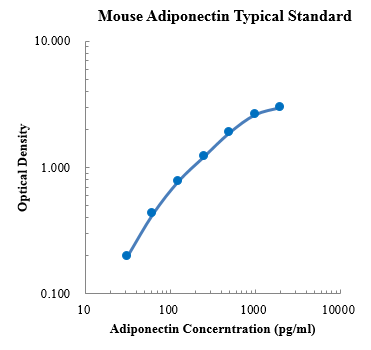
Mouse Adiponectin/Acrp30 ELISA Kit
$350.00 – $450.00
| Sample Type | Serum, plasma, cell culture supernatant, and other biological samples |
|---|---|
| Sample Volume | 10 μL |
| Sensitivity | 0.73 pg/mL |
| Range | 31.25 pg/mL – 2000 pg/mL |
| Assay Time | 3.5 h |
| Recovery | 92% – 113% |
| Average Recovery | 1.07 |
| Intra Precision | 5.1% – 8.8% |
| Inter-Precision | 7.3% – 7.7% |
| Platform | ELISA |
| Plate | Detachable 96-well plate |
| Size | 96T/48T |
| Storage | If the reagent kit is unopened, it should be stored at 4℃. However, if it has been opened, the standard solution should be stored at -20℃, while the other components should be stored at 4℃. |
| Delivery | 4℃ blue ice transportation |
| Components | 96-well polystyrene enzyme-linked immunosorbent assay (ELISA) plate coated with anti-Adiponectin/Acrp30 monoclonal antibody Mouse Adiponectin/Acrp30 freeze-dried standard Adiponectin/Acrp30 detect Antibody Standard Diluent Assay Buffer(10×) Substrate TMB Stop Solution Washing Buffer(20×) Sealing Film |
| Assay Principle | This kit utilizes the double antibody sandwich enzyme-linked immunosorbent assay (ELISA) detection technique.Specific anti-mouse Adiponectin antibodies are precoated on a high-affinity ELISA plate. Standard samples, test samples, and biotinylated detection antibodies are added to the wells of the ELISA plate. After incubation, Adiponectin present in the samples binds to the solid-phase antibodies and the detection antibodies. After washing to remove unbound substances, streptavidin-HRP labeled with horseradish peroxidase is added. After washing, a colorimetric substrate, TMB, is added and the plate is incubated in the dark for color development. The intensity of the color reaction is directly proportional to the concentration of Adiponectin in the samples. A stop solution is added to terminate the reaction, and the absorbance value is measured at a wavelength of 450 nm (with a reference wavelength range of 570-630 nm). |
Targets
ADIPOQ
ADIPOQ Target Infomation Overview
- Target Symbol: ADIPOQ, adiponectin, C1Q and collagen domain containing
- Gene Groups: C1q and TNF related
- Alias: ACRP30; apM1; GBP28; adiponectin
- Previous Names: ACDC
- Alias Names: adipose most abundant gene transcript 1; adiponectin precursor; adipocyte, C1Q and collagen domain containing
ADIPOQ, adiponectin, C1Q and collagen domain containing Target Infomation by Species
[su_tabs][su_tab title=”Human” disabled=”no” anchor=”” url=”” target=”blank” class=”tab-human”]
Human ADIPOQ Target Information
- Target Symbol: ADIPOQ, adiponectin, C1Q and collagen domain containing
- Alias:
- 30 kDa adipocyte complement-related protein
- ACDC
- ACRP30
- adipocyte complement-related 30 kDa protein
- adiponectin
- adipose most abundant gene transcript 1 protein
- adipose specific collagen-like factor
- ADIPQTL1
- ADPN
- APM-1
- APM1
- GBP28
- gelatin-binding protein 28
- NCBI_Gene: 9370
- UniProtKB: Q15848
Human ADIPOQ Predicted Functions
Enables hormone activity; protein homodimerization activity; and sialic acid binding activity. Involved in several processes, including negative regulation of cell communication; negative regulation of cell differentiation; and negative regulation of macromolecule metabolic process. Located in cell surface and extracellular space. Part of collagen-containing extracellular matrix. Implicated in several diseases, including carcinoma (multiple); cardiovascular system disease (multiple); non-alcoholic fatty liver disease; primary open angle glaucoma; and type 2 diabetes mellitus. Biomarker of several diseases, including autoimmune disease (multiple); cardiovascular system disease (multiple); diabetes mellitus (multiple); fatty liver disease (multiple); and inflammatory bowel disease (multiple).
[/su_tab]
[su_tab title=”Mouse” disabled=”no” anchor=”” url=”” target=”blank” class=”tab-mouse”]
Mouse Adipoq Target Information
- Target Symbol: Adipoq, adiponectin, C1Q and collagen domain containing
- Alias:
- Acdc
- Acrp30
- Ad
- adipo
- adipocyte complement related protein
- adipocyte, C1Q and collagen domain containing
- adiponectin
- apM1
- APN
- GBP28
- NCBI_Gene: 11450
Mouse Adipoq Predicted Functions
Enables hormone activity and identical protein binding activity. Involved in several processes, including detection of oxidative stress; negative regulation of cold-induced thermogenesis; and regulation of protein serine/threonine kinase activity. Acts upstream of or within with a positive effect on gene expression. Acts upstream of or within several processes, including brown fat cell differentiation; negative regulation of gluconeogenesis; and positive regulation of glucose import. Located in endoplasmic reticulum and extracellular space. Is expressed in several structures, including adipose tissue; axial musculature; gut; male reproductive gland or organ; and serum. Human ortholog(s) of this gene implicated in several diseases, including carcinoma (multiple); cardiovascular system disease (multiple); non-alcoholic fatty liver disease; primary open angle glaucoma; and type 2 diabetes mellitus. Orthologous to human ADIPOQ (adiponectin, C1Q and collagen domain containing).
[/su_tab]
[su_tab title=”Rat” disabled=”no” anchor=”” url=”” target=”blank” class=”tab-rat”]
Rat Adipoq Target Information
- Target Symbol: Adipoq, adiponectin, C1Q and collagen domain containing
- Alias:
- Acdc
- Acrp30
- Adid
- adipocyte complement related protein of 30 kDa
- adiponectin
- adiponectin d
- NCBI_Gene: 246253
Rat Adipoq Predicted Functions
Enables identical protein binding activity. Involved in several processes, including cellular response to organonitrogen compound; positive regulation of glycogen (starch) synthase activity; and positive regulation of protein phosphorylation. Located in extracellular space. Part of protein-containing complex. Used to study brain infarction. Biomarker of several diseases, including end stage renal disease; fatty liver disease (multiple); glucose metabolism disease (multiple); hyperthyroidism; and obesity. Human ortholog(s) of this gene implicated in several diseases, including carcinoma (multiple); cardiovascular system disease (multiple); non-alcoholic fatty liver disease; primary open angle glaucoma; and type 2 diabetes mellitus. Orthologous to human ADIPOQ (adiponectin, C1Q and collagen domain containing).
[/su_tab][/su_tabs]
ADIPOQ Target News
[catlist tags=”adipoq” template=targetnews thumbnail=yes thumbnail_class=”related-post-media clr” thumbnail_size=833]





